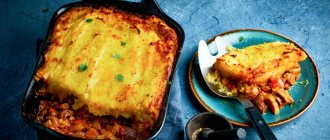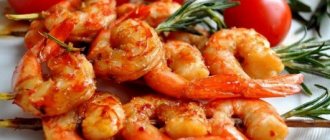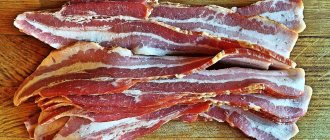"Save me, God!".
Thank you for visiting our website, before you start studying the information, please subscribe to our Orthodox community on Instagram, Lord, Save and Preserve † - https://www.instagram.com/spasi.gospodi/. The community has more than 60,000 subscribers. There are many of us like-minded people and we are growing quickly, we post prayers, sayings of saints, prayer requests, and timely post useful information about holidays and Orthodox events... Subscribe. Guardian Angel to you!
The issue of nutrition in Christianity cannot be called the most important, but still the consumption of certain foods often causes controversy and indignation; This applies in particular to meat, especially horse meat. Whether Orthodox Christians can eat horse meat will be discussed later in the article.
There is an opinion that any meat dishes bring harm to an Orthodox person, since he essentially eats the flesh and blood of the same living creature. As for horse meat, the issue here is even more controversial, because this animal is closest to humans and, as a rule, is rarely considered as an object of food. And still…
The best article for you, go to: Wedding in the Orthodox Church, rules of the sacrament, how it works
Meat food in Christianity
“Food should strengthen the body, not cause illness”
Saint Basil the Great
It is undeniable that for a baby the mother’s voice is more important than even the most sonorous voice of a beautiful rattle. So we, in search of answers to our questions, bypassing shallow half-truths, will lean with our infant hearts to the most dear and close to us parental voice of God.
The Triune Lord established the Church on earth and, having sanctified Her with his personal presence, preserves and guides Her with His boundless love.
Orthodoxy is a mountain path ascending over an abyss to Heavenly Jerusalem. You can follow this path only with a firm step, on two legs - with two commandments: love for God and love for your neighbor. The steps from which these feet start are the Holy Tradition and the Holy Scripture, where a lot of attention is paid to what we eat.
When we talk about meat, it can mean the following:
- meat is the muscle mass of a killed animal used for food;
- meat is also the name given to the dish itself, prepared from such muscle mass;
- meat also includes the muscle part of fish;
- muscle tissue itself can be called meat;
- and it may also be the pulp of the fruit surrounding the seed.
Pork, beef, lamb: are there any competitors?
The closest competitors of horse meat in terms of nutritional and energy value are pork, beef and lamb. These types of meat are widespread among us and are eaten by many people every day.
Pork
Pork is sold almost everywhere and is the most sought after meat in the world. This product is not considered dietary due to its fat content and possible allergenicity, as well as its rather difficult digestibility. The calorie content of pork ranges from 142 to 489 kcal per 100 g, depending on the type of prepared dish. Compared to other types of meat, pork compares favorably with its content of almost all B vitamins vital for humans.
Beef
Red meat, which includes beef, is traditionally considered the healthiest. Its average calorie content is about 187 kcal, however, taking into account the part of the carcass used and the method of its preparation, this figure varies significantly.
You may be interested in reading about the properties of soy meat, turkey and elk meat.
This product contains zinc, selenium and iron, as well as a balanced composition of amino acids, due to which moderate consumption of beef has a beneficial effect on the cardiovascular system and increases the level of hemoglobin in the blood.
Mutton
Compared to beef and pork, lamb is less fatty meat containing a low amount of cholesterol, so it can be safely included in the diet of people suffering from diabetes and obesity. The calorie content of lamb differs from the category (fatness) of meat.
Lamb of the first category is higher in calories - 209 kcal per 100 g versus 166 kcal of meat of the second category. But lamb of the second category is characterized by a high content of useful elements. Fluoride and calcium contained in the meat make lamb beneficial for maintaining teeth. For normal functioning, the human body needs to consume one and a half grams of protein per kilogram of weight daily, and a third of this amount should be proteins of animal origin. Whatever type of meat you choose for your menu, you should always remember that everything is good in moderation, and the more varied your diet, the more nutrients the body will absorb. Don't be afraid to experiment, try new foods and dishes and be healthy!
> Products prohibited during pregnancy
Kazylyk: benefits and harms
Horse meat is widely used in sausage production. Servelat, kazy (kazylyk), makhan, tutyrma (sujuk) are made from it. Sujuk can also include lamb or beef. Horse meat is also added to other types of sausages, due to which they become elastic and acquire a piquant taste.
Among all types of sausages, the most delicious is kazy. In Tajikistan and Uzbekistan, it serves as a festive dish. Kazylyk made from horse meat not only has an exquisite taste, but also benefits the body - it activates metabolism, promoting weight loss, and improves the functioning of the gastrointestinal tract.
Kazylyk can also cause harm to some people. Therefore, it is strictly contraindicated for gout. In addition, horse sausage is a natural product, which is why it can become infected with parasites. To avoid such a danger, you need to buy sausage only from trusted retail outlets.
Kazylyk
Can the product be used by pregnant and lactating women?
Since horse meat is not very common and popular in our country, when it is mentioned, the question naturally arises about who can consume it, and whether its use is harmful to pregnant and lactating women. Since nomadic tribes have been eating horse meat for centuries, it is obvious that it does not pose a direct threat to pregnant women and young mothers.
Important! It should be remembered that pregnant and lactating women should absolutely not eat half-raw and poorly cooked meat with blood.
The hypoallergenic nature of horse meat, as well as its rich composition, make horse meat acceptable in the diet of pregnant women. It is worth remembering, however, that a pregnant woman’s menu should be as varied as possible, and overconsumption of one type of meat can have a negative impact on health.
Horse meat will also be useful for nursing mothers due to its significant protein content, but for them it is less valuable than chicken, rabbit and turkey, so you can include it in your diet as a supplement, but not a replacement for other products.
Old Testament
The Old Testament says that you cannot eat the meat of strangled animals, as well as animals that died a natural death (they were not bled). It is also prohibited to eat blood sausage and other products that are made using blood. This prohibition is due to the fact that the Holy Scripture says that the soul is in the blood of animals. Under no circumstances should you eat the flesh of an animal along with its soul.
If a person eats the blood of an animal, he will take on the face of the animal whose blood he ate. Unclean meat includes: dead animals (without bleeding), crayfish, horse meat, crabs, fish without scales, rabbits, hares, fried blood of animals and birds. But at the same time, it is not forbidden to eat unclean meat in times of need or famine.
What a Christian should not eat
In general, the Christian religion hardly regulates human eating behavior. In Scripture you can find the words of Christ that it does not matter to him what a believer uses, only the spiritual and moral qualities of a Christian, his actions, words and thoughts are important. God created this world and everything in it is beautiful, without division into “pure” and “impure.”
At the same time, at different stages of the development of Orthodoxy, traditions appeared that implied the refusal of one or another food. The first people were vegetarians; their food, as well as that of everyone “in whom there is a living soul,” was grass and the fruits of trees. Such nutrition was beneficial to humans; in those days people lived for a very long time.
But then the population grew and new needs arose. In the time of Noah it was allowed to use “that which moves, that which lives.” Only meat with blood was strictly prohibited. Holy Scripture says that the soul of an animal is in the blood. Blood may only be used for sacrifices or spilled on the ground. This explains the ancient tradition of bleeding an animal before eating its meat.
10 ideas for storage spaces in the country: birdhouse-box, bicycle stand and others
Wide trousers, short skirts and vests: school “uniforms” in the USA during the hippie era
New friendly family: Harry and Megan will take Megan's mother to their new home
Later, the Jews were given instructions about food through Moses. The Old Testament says that you should not eat the meat of animals that have been strangled or died of natural causes.
The following were considered unclean meat:
- dead animals (who were not bled);
- crayfish;
- horsemeat;
- crabs;
- fish without scales;
- rabbits and hares;
- fried blood of animals and birds.
At the same time, forbidden food was allowed to be consumed during periods of need or famine.
^ Is the Lord blessed any meat for consumption?
There is one important reservation that the Lord made when blessing meat foods. He divided all animals into clean and unclean (Old Testament).
- A CLEAN animal has
- artiodactyls and
- ruminant.
- UNCLEAN foods are animals that lack at least one of these characteristics. This means that such meat is not suitable for consumption.
Also unclean food includes meat sacrificed to idols, that is, the carcass left over from an animal after it was sacrificed to an idol.
Reader question: “Help resolve the dispute within our family! Our aunt says that an Orthodox person should have many prohibitions regarding food, and these prohibitions should not be limited only to fasting. She says that an Orthodox person should cook meat food only on holidays, but we cannot eat food from other nations, Uzbek, Japanese, Korean, Tatar. And my mother tells her that after praying, you can eat any food. Who is right?!”
What’s interesting about this dispute is that, under certain conditions, both women can be right. It all depends on where the spiritual gaze of each of them is directed. “Do not strive for food that perishes, but for food that endures to eternal life,” says the Apostle John. And if these women look at that food in this way, as reinforcement of strength for mastering spiritual food, then this is simply a conversation between two angels calling each other to embark on the joy of their path.
For the first, apparently, abstinence is necessary for fear of losing the most precious feeling of God that was once given to her. Trying to save it, she clumsily, perhaps worries about all her loved ones who, in her opinion, do not protect this feeling.
And for the second, it is quite possible that at the spiritual height of her heart, food is needed only in order to contemplate at least one more day the illuminated face of our Lord Jesus Christ. Thus, once upon a time, the Lord Himself, out of hungry human necessity, blessed the apostle to eat unclean food during his prayer work (Acts 10:9-15).
For the peace of their conscience, the first type of people needs to decide what, according to the Old Testament laws, a Christian is allowed to consume and what not. This is also useful for people who accidentally stray from the God-saved path to worship their belly or the food itself, about which, as the Apostle Paul says, “it is written: The people sat down to eat and drink, and rose up to play” (1 Cor 10:7), or rather , Lopukhin corrects “to dance,” that is, to commit fornication.
“Control your belly before your belly dominates you.” St. Basil the Great.
So “... food of other peoples .. we are not allowed”?!
In continuation of the question from our reader, let's briefly define the differences in the dietary restrictions of an Orthodox person and representatives of other religions, close and not close to us in relation to the Holy Scriptures of the Old Testament. To do this, it is necessary to briefly mention our general prohibitive concepts in the field of nutrition.
Panacea for nomads
In Central Asia, for example, horse meat has been eaten since ancient times. This custom was introduced by nomadic tribes. Firstly, horses were always at hand, and secondly, their meat is quickly digested and has a warming effect. Doctors say that horse meat is the most environmentally friendly meat, it has the highest protein content with an ideal balance of amino acids. It reduces the amount of cholesterol in the blood, regulates metabolism in the body and even neutralizes the effects of radiation. In addition, it contains a lot of useful vitamins and microelements. In short, horse meat is quite capable of replacing a complete diet. And yet - it is hypoallergenic and can be given to children.
Reader question: Will vegetarianism save the world?
Some people mistakenly believe that complete abstinence from meat foods will lead humanity to the highest moral point of its development and, as a consequence of this, the world will be saved. However, the pages of Holy Scripture say that such a law does not work. The Lord destroyed the entire vegetarian population of the earth with a flood. Yes, yes, before Noah, all of humanity ate only plant foods and, despite this, complete corruption of morals still reigned on earth, corruption of such baseness that the Lord had to take such a decisive extreme step.
«Beware of measuring fasting by simply abstaining from food. Those who abstain from food and behave inappropriately are like the devil, who, although he does not eat anything, does not stop sinning.
b".
Saint Basil the Great.
What does the Bible say about meat?
In chapter six of Genesis, verses 19-20, it is said that God ordered Noah to take every creature in pairs in order to preserve the species of animals on earth, to protect them from the flood. ... Therefore, the corpse-eating scribes divided the animals into clean and unclean (a purely demonic practice) and the clean ones increased in number.
Interesting materials:
How to change your VK page on Instagram? How to change the temperature on the Starline key fob? How to change the theme on Insta in Direct? How to change the appearance of tabs? How to change the owner of a page on Facebook? How to wash a large ficus? How to wash a ficus in the shower? How can you tell if borscht is spoiled? How to understand that your ex-boyfriend is bored? How to understand that a house is Khrushchev?
^Is it a sin to kill animals for food?
In order to answer this question, it is necessary to turn to the Holy Scriptures, above which the Holy Church never exalts itself.
In the book of Genesis (Genesis 1:29) it is written that the Lord gives us “every herb bearing seed that is on all the earth, and every tree that has fruit yielding seed,” and says that for us “this will be for food." Here, for the first people, it is clearly stated that only plant foods are intended for humans.
However, after the global flood, when eight people left the ark on bare ground, there is no doubt that such barren soil could not feed them for a long time. Then the Lord allowed them to eat meat. That is, the Almighty Himself, the Creator of the entire universe, blesses the eating of meat food according to the prevailing circumstances. But even here He does not say: “I give you permission for a while.” He simply blessed.
The Lord is Love and everything He does is good care for all living things in our earthly life and, importantly, beyond it. Consequently, neither the killing of all people on the planet during the flood, nor the death of animals by God’s blessing does not contradict His good providence for all of us, no matter how terribly it may impress us.
“The one who thinks is wrong is
that fasting only means abstaining from food.
True fasting is removal from evil..."
St. Basil the Great.
Is it possible for Orthodox Christians to go to rallies?
Answered by Priest Gregory Barashko
Let us immediately remember that the prohibition of eating unclean animals (including pork) was given by God to the people of Israel in the Old Testament through the prophet Moses. But what happened before that?
Before the fall of Adam and Eve, of course, there was no meat food at all.
“And God said, Behold, I have given you every herb yielding seed that is on all the earth, and every tree that has fruit yielding seed; - This will be food for you; And to every beast of the earth, and to every bird of the air, and to every thing that creeps on the earth, in which there is life, I have given every green herb for food. And it was so” (Genesis 1:29-30).
After the Fall, although nothing is specifically said about this, apparently, meat could already be eaten, as can be seen from the fact that the son of Adam and Eve Abel was a shepherd of sheep.
But it was only after the flood that the Lord pointed out to Noah directly: “Every moving thing that lives will be food for you; I give you everything like the green grass” (Genesis 9:3). It is important to note here that it was still possible to eat everything, that is, all animals.
Further in the chronology, you remember that from Noah the human race began to spread across the face of the earth and soon many of his descendants (mainly from the sons of Ham and Japheth) began to forget the True God and became pagans. Forgetting God, these peoples led a sinful lifestyle and all their deeds, at all times, were evil.
It was then that the Lord wanted to separate His chosen people (those who maintained the true faith) from the pagans by commanding them through Moses to strictly observe certain laws (one of which forbade the Jews from eating unclean animals).
Let us look at the text of the Holy Scripture: “You are a holy people to the Lord your God, and the Lord has chosen you to be His own people from among all the nations that are on earth. Don't eat any nasty stuff. Here are the livestock that you can eat: oxen, sheep, goats...” (Deut. 14: 2-4), then the animals that you cannot eat are listed. This relationship is clearly visible here - selection from other peoples and a selective approach to food.
This law, like many others, was supposed to protect Jews from close communication with pagans, which always led to the corruption of morals and, as a result, a distortion of faith.
It must be pointed out that the symbolic side of the issue is also of great importance. The Old Testament is full of symbols: the Burning Bush represented the Mother of God, the son of Abraham Isaac represented Christ Himself, the passage of the Jews through the Red Sea represented the sacrament of baptism, etc., etc.
Unclean animals were prototypes of pagan peoples.
Let us remember the vision of St. Peter, who saw “the sky being opened and a certain vessel descending towards it, like a large sheet, tied at the four corners and lowered to the ground; in it were all four-legged creatures of the earth, animals, reptiles and birds of the air. And a voice came to him: Arise, Peter, kill and eat. But Peter said: No, Lord, I have never eaten anything bad or unclean. Then another time a voice came to him: what God has cleansed, do not consider unclean. This happened three times; and the vessel ascended again into heaven” (Acts 10:11-16). This vision showed the ap. Peter that the faith of Christ should henceforth spread among other pagan peoples. Which is what subsequently happened.
Impure peoples, through the adoption of the true faith, were purified, and the ban on eating “unclean” animals was abolished, like many other laws and rituals of the Jewish people.
At the Apostolic Council (see Acts, Chapter 15) it was specifically determined that newly converted Christians, from pagan believers, would not observe any rituals or laws of the Jews, but only “that they should abstain from what was defiled by idols, from fornication, strangulation and blood.” , and so that they don’t do to others what they don’t want for themselves.”
The following scripture may also be interesting:
“The Spirit clearly says that in the last times some will depart from the faith, giving heed to seducing spirits and teachings of demons, through the hypocrisy of liars, having their consciences seared, forbidding marriage and eating what God created so that those who are faithful and know the truth ate with thanksgiving. For every creation of God is good, and nothing is blameworthy if it is received with thanksgiving, because it is sanctified by the word of God and prayer” (1 Tim. 4:1-5).
Now, according to your question, we can conclude: the ban on eating pork was canceled by God Himself through St. apostles, canceled because it has lost its meaning and relevance.
Hello! Please explain why Christians were first forbidden to eat pork, and then allowed in the New Testament. Nothing has changed for Muslims. Who made these changes and why? I read the New Testament and still did not find any specific permission to eat pork. I want to be a real Christian, and I would like to understand this issue. If it’s forbidden, then so be it, but I don’t want to sin. Thank you.
Leonid
Why can’t you eat rabbit, horse meat, or hare?
This prohibition is due to the fact that it is permissible to eat only the food of those animals that have a cloven hoof or chew the cud. These animals include: goats, cows, sheep, and those that, by modern standards, are classified as artiodactyls. You also cannot eat hares, because although this animal chews cud, it does not have cloven hooves.
The ban on eating rabbit and hare meat is also due to the fact that these animals are killed with a blow to the back of the head, which means that the blood remains in the animal, and Orthodox Christians are not allowed to eat meat with blood.
Islamic food – conditionally permitted
«Halal
“is the concept of what is permissible and permissible in Islam. The opposite concept is “ haram”
" Typically, these words denote acceptable and unacceptable food.
The following are considered haram by Muslims:
- pork and its derivatives,
- Consumption of meat with unbleeded blood and carrion is prohibited,
- as well as meat with blood released, but cooked without pronouncing the name of Allah.
*Muslims are allowed to eat meat that was prepared only by the “People of the Book.” These include Christians, Jews and Muslims themselves.
What to do
If you do not take into account the period of fasting (which is not discussed and is a clear rule), then eating horse meat by a person also has its own nuances, which it is advisable to listen to, namely:
- one must try not to enslave oneself to the material principles of this world;
- one should always maintain peace of mind and submit to the spiritual principle;
- It is important to remember that the main thing is to serve the Lord faithfully.
Thus, the expression “Orthodox people cannot eat horse meat” is not absolute, and the debate around it will not lose its relevance for a long time, because everything in this case, despite various life situations, depends on the person himself - his faith, life principles and spirituality.
The best article for you, go to: What does chastity mean?
The Lord is always with you!
Can Orthodox Christians have sex?
Avoiding intimate life against the will of one of the spouses, even during Lent, is a grave sin.
There are certain days when Orthodox Christians are not allowed to have sex. But I’ll say right away that marital fasting is possible only by mutual consent. The Apostle Paul directly writes about this in his epistle.
Allowed
Everything else: mutual pleasures and various caresses, the duration of the process itself, etc. depend on the piety of the spouses. From their personal choice, opinion and decision. Any prohibitions are possible only by mutual agreement; and if one of the spouses is not ready to tolerate any prohibitions or restrictions, then his other half is obliged to meet him halfway.
Quotes
So that no one thinks that I am saying “gag,” I will write here what any Orthodox family man should base his opinion on.
Apostle Paul:
“The husband show his wife due favor; likewise is a wife to her husband. The wife has no power over her body, but the husband does; Likewise, the husband has no power over his body, but the wife does. Do not deviate from each other, except by agreement, for a while, to practice fasting and prayer, and then be together again, so that Satan does not tempt you with your intemperance.” (Epistle to the Corinthians).
Rule 4 of Saint Dionysius of Alexandria:
“Those who marry must be their own dominant judges. For they heard Paul writing that it is proper to abstain from each other, by consent, for a time, in order to practice prayer, and then again in life.”
Saint John Chrysostom:
“A wife should not, he says, abstain against the will of her husband, and a husband should not abstain against the will of his wife. Why? Because great evil comes from this abstinence; this often resulted in adultery, fornication and domestic disorder.”
Conclusion
The Church has never established laws prohibiting the marriage bed of spouses; the maximum that we find in Scripture and rules is advice and calls to piety.
But if someone tells you that on such and such a day the Church prohibits marital intimacy, then you can safely inform the person about his mistake. The Church does not prohibit; the Church only advises abstinence sometimes by mutual consent. God bless everyone!
Why are there food bans?
The Apostolic Canons contain special instructions on the attitude of Christians to the Old and New Testaments. It says: “ The books that should be read, the Old and New Testaments, are
" Therefore, the Orthodox Church anathematized, that is, excommunicated from Herself, all those who doubted the holiness and inspiration of the books of the Old and New Testaments.
Saint Ambrose of Milan called both Testaments “cups of wisdom” in our hands, because, he said, from “ both you drink Christ
».
God's contract with people
The word "covenant" means agreement. The “Old Testament” means an agreement with the ancient righteous patriarchs, that is, the fathers and representatives of the peoples of the earth - Noah, Abraham, Isaac and Jacob. They can be imagined as precious seeds that fell into the hand of a sower during a period of worldwide drought. The Lord’s goal is to protect the life in these seeds from disease and death, that is, to preserve the purity of faith and the race in which Christ, the Savior of the world, should be born. Therefore He makes strict demands on faith, devotion and obedience. In return, He gives His blessing and promises to grant salvation to the people of God.
The Almighty's care for His people consisted in His commandments, some of which were the commandments to be attentive to food. However, it is necessary to understand that now that Christ has already been born, lived among us, was crucified, resurrected and sits at the right hand of God the Father, this Old Testament agreement, strict for obvious reasons, has been carried out. And now the time of the New Testament is stretching out for us, an agreement between all people without distinctions or distinctions, an agreement of “repentance-forgiveness”, the main criterion of which is our personal conscience.
^ Blood cannot be eaten, but how can it cleanse the soul?
The indications that “this blood cleanses the soul” speaks of sprinkling God’s altar as a deposit for the sin committed (details in the book of Leviticus).
This bloody act, with a superficial look at the history of Holy Scripture, seems senseless and cruel. However, everything remains difficult to explain until the Lord Jesus Christ appears. The Savior Himself became a “calf” for the altar and sprinkled His Blood on the Altar-Cross in order to once and for all cleanse our souls from the abyss of alienation from God. This divine instruction is a prototype of the Great future Sacrifice for our sins. “Christ <..> with His blood entered once into the sanctuary and obtained eternal redemption” (Heb. 9:11,12), says the Apostle Paul in a letter to the Jews.
This is how the God-Man reconciled man through His Blood with God the Father. So we too, through partaking of the Blood and Flesh of God, stepping across an insurmountable abyss, become involved in the Kingdom of Heaven.
How to choose and store horse meat correctly
Externally, horse meat is similar to beef, but differs in the dark color of the flesh. Horse fat is soft, white and melts easily in your hands. The texture of the fresh product is elastic and dense, and when you apply a napkin to the cut, there will be no wet marks left on it.
Distinctive features of a low-quality product:
- brown or silver;
- yellow fat;
- mucus and stains on the surface;
- strong unpleasant odor;
- blurred, uneven edge of a piece on a cut.
It is best to pack the product in vacuum packaging or a container before putting it in the refrigerator. However, even in this case, storage of chilled meat should not exceed 72 hours. Horse meat should be frozen in small pieces, individually wrapped in foil, but not in plastic or cling film.
Freezing helps preserve the beneficial qualities of the product for up to six months.
Important! It is not worth storing horse meat without freezing for a long time, since the almost complete absence of carbohydrates in the meat promotes the growth of bacteria.
The longest storage of meat - up to two years - is allowed when it is dried. To dry horse meat, you need to salt it generously and leave it in the refrigerator for a day, then cut it into pieces and drain the juice. Drying continues for up to four hours in the oven at 50 °C. Dried horse meat is stored in tightly closed jars in a dry and dark place. For further consumption, dried meat must be fried or boiled.
Using horse meat in cooking: step-by-step recipes with photos
Cooking horse meat is a long and labor-intensive process, but the result usually fully justifies all the costs. We bring to your attention several classic folk recipes.
Shuzhuk in Kazakh, how to cook horse meat sausage
Ingredients: horse meat – 1 kg, horse fat – 500 g, intestines – 350 g, garlic – 7 teeth, salt – 2 tbsp. l., black pepper - 1.5 tbsp. l.
Preparation procedure:
- Turn out and rinse the intestines thoroughly. Then add salt and set aside.
- Cut the fat and meat into cubes, place in a deep bowl and mix.
- Add salt and pepper to the meat, squeeze out the garlic, mix and leave for half an hour.
- Turn the intestine outward and secure one edge with a toothpick, then fill it tightly with minced meat, expelling the air, and secure the second edge with the same toothpick, forming a ring of sausage.
- Carefully cut off the film from the intestines and put the sausage in the refrigerator for a day so that the minced meat is well marinated.
- Place the shuzhuk in a pan of cold water and after boiling, remove the foam and make several punctures.
- Salt the water and cook the sausage over low heat for one and a half to two hours.
- The cooled, ready-made shuzhuk can be cut and served.
Horse meat shurpa
Ingredients: horse meat (ribs) – 1 kg, onions – 2-3 pcs., tomatoes – 3 pcs., carrots – 3 pcs., potatoes (medium size) – 5 pcs., bell pepper – 2 pcs., pepper hot – 1 pc., garlic – 3 teeth, cumin, ground black pepper, salt, herbs.
Preparation procedure:
- Wash and cut the meat into large pieces - approximately 50-70 g.
- Peel, wash and chop the vegetables. Potatoes, depending on size, are cut into halves or quarters. Carrots, bell peppers and tomatoes - in large pieces. Onion - in half rings.
- Place the meat in a saucepan with cold water and place over high heat. After boiling, remove the foam and simmer until half cooked over low heat for about 1 hour.
- Add vegetables to the meat: carrots, bell peppers, tomatoes, onions. Then add spices, garlic cloves and whole hot peppers.
- Place the potatoes on top and boil everything together under the lid for another 40 minutes.
- Let the finished shurpa brew for another 10 minutes, then sprinkle with chopped herbs and serve.
Rabbit and hare meat, horse meat: why are they prohibited?
According to Scripture, it is permissible to eat only the meat of animals with cloven hoofs and those that chew the cud. These are goats, cows, sheep, etc. Hare meat is prohibited because the animal does not have cloven hooves, although it chews the cud.
In addition, the meat of a rabbit or hare cannot be eaten, because they are killed by hitting the back of the head, and the blood does not come out of the animal, which means it is also eaten, which is unacceptable for Orthodox Christians.
There is no single answer regarding horse meat. Meat belonged to the “unclean” species. Most likely, the reason for the ban was that horse meat contains many substances that negatively affect human health.
Is pork allowed?
The Bible says that although a pig has a cloven hoof, it does not chew the cud and is unclean. Therefore, you cannot eat pork meat.
At the same time, the New Testament says that you can eat everything that is sold in the market. And when following the unbelievers at their invitation, you cannot refuse what is offered to you.
The New Testament does not prohibit a Christian from eating pork. It also has no laws regarding other foods. It is allowed, although not encouraged, to eat all types of meat that were prohibited by the Old Testament, except carrion and blood. But at the same time, there are restrictive fasts that must be adhered to.
Regarding nutrition, it is worth remembering these words from the Bible: “Everything is lawful for me, but not everything is beneficial.” When consuming various foods, a person must take into account that not all of them will be for the good. Apparently, Christian prohibitions regarding food were based on this. The body is the vessel for the soul, so we must keep it healthy. And this can be done with a healthy diet.
Found a violation? Report content
Diet meat
So, we have studied almost all the beneficial properties and contraindications of horse meat. For nutritionists, this meat is a valuable component due to its low calorie content. They developed many diets based on the consumption of horse meat. In just a couple of weeks of using the diet menu, you can lose up to 5 kg of excess weight without harming your own health.
We have already said that horse meat contains many organic acids. Due to this, it frees the body from toxins and improves its metabolic processes.
Horse meat is hypoallergenic, so it does not contribute to allergies. It is useful to include it in the diet of adults and children suffering from lactose intolerance (inability to digest cow's protein), often accompanied by allergic reactions to chicken eggs and meat.
Horse meat as a way to lose weight
The unique properties of horse meat are used by nutritionists when developing diets for weight loss. We present to your attention one of the diet options, thanks to which you can lose from four to eight kilograms in a couple of weeks.
1st day
- Breakfast: boiled rice without oil and seasonings, 200 g of boiled horse meat and tea without sugar.
- Lunch: vegetable salad; 300 g horse meat goulash without potatoes - with carrots, onions, celery and tomatoes, without hot spices; a glass of freshly squeezed juice.
- Dinner: vegetable salad, 100 g of boiled horse meat and tea.
- At night: a glass of low-fat kefir or yogurt.
Juices are very beneficial for the body, read about the benefits of: carrot, tomato, cabbage, potato, beet, pomegranate, lemon, pear, cherry and birch juices.
2nd day
- Breakfast: a small apple, 100 g of boiled horse meat and porridge with water (buckwheat, oatmeal, millet, barley).
- Lunch: 200 g of stewed horse meat, fruit (not bananas or grapes), herbal tea.
- Dinner: 200 g of boiled or stewed horse meat, a small amount of whole grain bread, vegetable salad, herbal tea.
- At night: 200 g of cottage cheese.
Alternating such a menu with the additional use of vitamin and mineral complexes and drinking plenty of herbal decoctions and clean water will allow you to achieve the desired result in just a couple of weeks.
Contraindications to eating horse meat
Horse meat is contraindicated for consumption raw, as it may contain salmonella, a dangerous parasite for humans that can lead to serious consequences, including death. Horse meat can also serve as a carrier of trichinosis, a parasite that causes digestive disorders and sometimes bleeding.
Horse meat, like any other meat, is not recommended to be consumed in large quantities. Excessive consumption of this product increases the risk of cardiovascular diseases, as well as the skeletal system (osteoporosis).
Video from YouTube on the topic of the article:
About the benefits of horse meat
Despite its small popularity, horse meat is deservedly considered a very healthy and environmentally friendly meat. Its benefits are based on characteristics such as nutritional value and digestibility.
For adults
Horse fat occupies an intermediate position between fats of animal and vegetable origin, and therefore contributes to good regulation of metabolism. Eating horse meat helps lower blood cholesterol levels and also helps neutralize radioactive exposure. Doctors recognize its choleretic and anti-sclerotic effect, and nutritionists use horse meat in the fight against obesity.
Did you know? Horse meat is taboo in many English-speaking countries, for example, the UK, USA, and Ireland. It is also not consumed in Brazil and Spain. Representatives of the Roma people also do not use horse meat for food, and for Jews it is prohibited for religious reasons.
For children
In addition to being ecologically clean and quickly digestible, horsemeat is also hypoallergenic, which is especially important when it comes to baby food. Since horse meat is dietary and very healthy, it is allowed to be used in children's menus and in the first years of a baby's life.
Along with rabbit meat, it is also suitable for the first meat feeding, which can begin in minimal quantities from the age of six months. For the first time, a portion of no more than 5 g is enough, gradually increasing to 50 g. After a year, the child can be given 70-90 g of this product, but not more than three to four times a week. Naturally, for baby food it is necessary to take a fresh product from a trusted manufacturer.
Why did the people of Ancient Rus' not eat rabbits?
Copied 12/11/2020 07:42:02 from the page https:///pochemu-na-rusi-zapreshheno-bylo-est-krolikov-i-pri-chyom-tut-religiya-517278.html - Mozilla/5.0 (Windows NT 6.3; Win64; x64) AppleWebKit/537.36 (KHTML, like Gecko) Chrome/81.0.4044.122 Safari/537.36 [2a01:4f8:162:6426::2]
In Rus', rabbit meat was not consumed until the Moscow Patriarch Nikon carried out a reform. Despite the positive qualities of rabbit meat, for many years it was classified as a prohibited food. The reason was religion: rabbit meat was considered unclean.
The situation changed in the 50s of the 17th century during a schism in the Orthodox Church. At the same time, Moscow Patriarch Nikon proclaimed a reform regulating the abolition of ancient church laws in Rus' and the simplification of the order of worship.
Thanks to the new reform, rabbit meat appeared on the tables. However, even in the 60s, the Old Believers lived according to the old canons, believed in anathema (curse), and therefore did not eat rabbit meat. In our time, there are still Old Believers who do not eat rabbit meat, like their ancestors.
Products prohibited during pregnancy
If you are pregnant, everyone around you is talking about what you should eat and what not, and you no longer know who to listen to... We will tell you about the foods that you should actually avoid during pregnancy.
Among the foods prohibited during pregnancy: 1. Alcohol: not even a drop. No amount of alcohol is safe, so you should not drink even a drop during pregnancy, since the fetus is very sensitive to alcohol, it can harm it to one degree or another. If you really want a cold beer, you can drink it, but make sure that the beer contains 0% alcohol. 2. Without coffee and without tea It is better to do with caffeine-free and tea without theine. If you really love coffee, you can drink a cup of coffee a day so as not to be tormented by the desire, but no more, because caffeine penetrates the placental barrier and affects the child’s nervous system. 3. Neither liver pates nor blue cheeses These are gourmet foods, but not recommended during pregnancy. Liver pates contain a lot of vitamin A, which could be harmful to the child during development. Other types of pates can be consumed safely (but in moderation), always placed in tins, this reassures you that they have passed sanitary control. Regarding blue cheeses (Camembert, Roquefort), you should not eat them because they can cause listeriosis, an infection that could be very serious for the baby you are expecting. Yes, safe pasteurized cheeses. 4. No fish, no meat, no raw seafood. Even if you like them, stop eating them. No carpaccio, sushi, oysters... They can contain microorganisms and cause you some kind of infection or food poisoning, such as toxoplasmosis or anisakiasis. The first can damage the embryo, and the second, although it cannot directly affect the fetus, can cause problems in the body, and as you understand, drug treatment during pregnancy is contraindicated. At the same time, boiled seafood can be consumed without any problems. 5. Ban on smoked meats You should also avoid smoked meats. The reason is that the process of smoking salmon or other fish does not guarantee the absence of the parasite that causes anisakiasis, and therefore you cannot consume them with complete safety. 6. No, very fatty sausages Salami, smoked sausage, smoked ham sausage... are very tasty, but they should be prohibited during pregnancy. First, they are high in fat, making it difficult to manage your weight during these months. And, in addition, there is a high probability of contracting toxoplasmosis; Although the risk is low, it is better not to take any risk at all.











